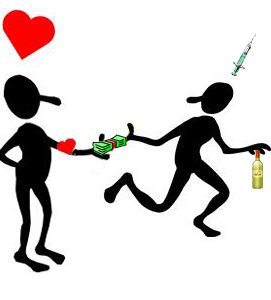What’s the difference between enabling someone and helping them?
Living in recovery and working in the recovery field I hear the term, “enabling” thrown around a lot. It’s confusing to know when you are helping your loved one live or when you may be enabling a horrible disease. I find myself having to decipher for families exactly what all of this means.
You don’t want to enable this disease to kill your loved one. You don’t want to make it possible, practical or easy for an addict to get high. You shouldn’t provide an alcoholic with the means or opportunity to get drunk. But some of you are doing that every day. And you don’t even know it. You think you are helping them. And you feel like you’re hurting them by going against what you’ve been providing them all of their lives if you take those things away.
But what’s the answer? Is it really a gray area? Are enabling and helping the same thing?
No.
There IS a difference between helping and enabling someone struggling with drug or alcohol addiction and knowing what this difference will be crucial to getting your loved one into treatment.
What is enabling a drug or alcohol addiction?
Giving him money when he asks. He will beg, plead, or even threaten violence. She will tell you that she’s starving, needs medical attention, ran out of gas, is about to have her water turned off – I could go on and on. Listen to me – do not give up the cash. I promise that he is using that money to support his habit.
Paying for a car, car insurance, and gas. I don’t care if she needs the car to get back and forth to work or school. She is also using that vehicle to get back and forth to her supplier, or worse transporting drugs to other people. If she’s working then she should be able to pay for her car, car insurance and gas. Remember that.
Paying for a cell phone. I know that you feel like he or she needs to be able stay in contact with you, especially now that they are gone for days at a time and you don’t know where they are. But I need you to know that that cell phone also contains the phone numbers to their dealers and using buddies. By providing the means to call them, you’re helping them get high.
Providing her with money for rent, utilities, or a hotel room. By doing this, you’re giving them a place to use. This will not be easy. But to provide this money is enabling. Not helping.
Bailing her out of jail and bringing her home. She needs to realize the consequences of her actions. Help her by not bailing her out.
Allowing him to continue to stay in your home. I know you think that just putting him out on the street is too much for you to handle. But keeping him rent free in your home is not helping him it’s enabling him. II cannot stress to you enough that you will eventually come home and find your son dead in his bedroom. This will happen because he is bringing drugs into your home and getting high there. He is doing that every day. He is doing that right now. Help him by telling him he cannot live in your home until he gets treatment. And mean it.
What is helping?
Giving them food. As a treatment specialist I have no problem with you meeting your son at McDonalds and buying him a cheeseburger. Staying connected and making sure your son has a little food in his belly is ok. It provides you the opportunity to ask if he’s had enough of his addiction. But only food and nothing else. No money. No gas. No cell phone.
Seek professional help by contacting an interventionist. A professional intervention dramatically increases your chances of getting your loved one into treatment.
Finding the right treatment for her. And if she relapses, find it for her again. If she had cancer, you would do anything to get her cancer into remission. Treatment is what puts the disease of addiction into remission. Don’t give up just yet – if it’s her third time – what if it works? Paying for treatment and paying for deductibles is just like providing medication. And is far better than paying for a funeral.
Answer the phone. He is likely calling to see if you will give him more money. Don’t give him more money. On these calls do your best to stay strong, tell him how much you love and miss him and never miss an opportunity to say, “Are you ready to go to treatment?” If he isn’t, it’s ok. If you’ve done the things in this blog, one day soon he will be ready. I know this first hand because I see it every single day.
The disease of addiction is more than just the individual suffering. Because we let addiction fester in a person hoping they will just “stop” it – a person often stays sick much longer than necessary and the family tends to unwittingly enable them during this time. If we treat addiction like the disease it is, arm ourselves with the signs and symptoms of addiction, we can get a person into a great treatment program that will treat this disease effectively the first time.
Enabling your loved one can put them in their grave. Trust in what you’ve read here and change your behaviors. Helping your loved one will save their life.
Don’t be afraid to reach out – you never know how amazing it can be.


